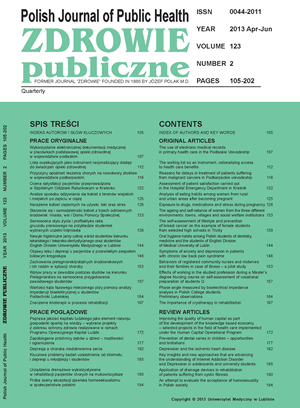Reasons for delays in treatment of patients suffering from malignant cancers in Podkarpackie voivodeship
DOI:
https://doi.org/10.12923/j.0044-2011/123-2/a.03Keywords:
cancer , oncological prophylaxis , treatment delaysAbstract
Introduction. In the case of oncological patients, early implementation of treatment is a key matter. Any delays oc- curring on each of the levels of diagnostic and therapeutic processes may affect the outliving of the patients. Elimina- tion of their reasons could reduce the time scale of the de- lays, increase the percentage of cancer instances detected in initial stages, as well as improve patients’ prognoses.
Aim. The basic objective of this thesis was to identify the main reasons for the delays in the treatment of oncological patients. The additional goal was to establish the sources of information on prophylaxis collected by the patients.
Material and methods. The research comprised108 peo- ple who were treated in a stationary treatment system in two specialized oncology centers in Podkarpacie. The method consisted in a diagnostic poll and the employed technique was a survey carried out in the form of a standardized inter- view.
Results. Among the reasons for the delays that patients contributed to the most commonly mentioned were: lack of knowledge about the symptoms that could suggest cancer and as well as disregarding the symptoms. Eighty-one per cent of the respondents gave more than one reason. Among all respondents, 84% do not know the symptoms that may suggest cancer, 98% claim that actions, which promote this area of knowledge, are needed, and the highest rated source of information is a GP.
Conclusions. The majority of the reasons for the delays in cancer treatment are those, which lie on the side of pa- tients and these are also responsible for the longest average time of procrastination. Delays in treatment on account of the health care system organization seem to be a relatively smaller problem in comparison to those on the side of pa- tients. General practitioner, who constitutes an essential link in the system of fight against cancer in the population, is considered by the patients to be the most reliable source of information on oncological prophylaxis.
References
1. Jędrzejczak W, Deptała A. Czym jest nowotwór, czyli wstęp do biologii nowotworów. In: A. Deptała (ed). Onkologia w praktyce. Warszawa: PZWL; 2006. p.14.
2. Kulik TB, Stefanowicz A, Pacian A, Żołnierczuk-Kieliszek D. Możliwość profilaktyki chorób nowotworowych w podstawowej opiece zdrowotnej. Zdr Publ. 2004;114(3):275-8.
3. Robinson KM, Ottesen B, Christensen KB, Allan Krasnik A. Diagnostic delay experienced among gynecological cancer patients: A nationwide survey in Denmark. Acta Obstet Gynecol Scand. 2009;88:685-92. Review match
4. Korzeniowska E, Puchalski K. Promocja zdrowia w miejscu pracy w Polsce. Materiały z konferencji. Promocja zdrowia w polityce zdrowotnej i społecznej państwa. Warszawa; 2005. Review match
5. Pawlicki M, Michalczyk A. Badania przyczyn opóźnień leczenia chorych na nowotwory złośliwe. Współ Onkol. 2005;9(5):191-5.
6. Wronkowski Z, Brużewicz S. Chemioterapia i radioterapia. Warszawa: PZWL; 2007. p. 5.
7. Pawlicki M, Rysz B. Badania nad przyczynami opóźnień w rozpoczęciu leczenia na nowotwory złośliwe. Nowotwory. 2001;519(5):494-8.
8. Pawlicki M, Rachtan J, Brandys A, et al. Przyczyny opóźnień leczenia chorych na nowotwory złośliwe. Post N Med. 1992;5:35-6.
9. Pawlicki M, Rachtan J, Żuchowska B. Ocena przyczyn opóźnionego leczenia chorych na nowotwory złośliwe. Nowotwory. 1989;39(1):31-6.
10. Facione NC, Miaskowski C, Dodd MJ, Paul SM. The self-reported likelihood of patient delay in breast cancer: new thoughts for early detection. Prev Med. 2002;34(4):397-407. Review match
11. Boffetta P, Parkin DM. Cancer in developing countries. CA Cancer J Clin. 1994;44(2):81-90.
12. Malik IA, Gopalan S. Use of CAM results in delay in seeking medical advice for breast cancer. Eur J Epidemiol. 2003;18(8):817-22. Review match
13. Mandelblatt J, Andrews H, Kerner J, et al. Determinants of late stage diagnosis of breast and cervical cancer: the impact of age, race, social class, and hospital type. Am J Public Health.1991;81(5):646-9. Review match
14. Wright GP, Wong J, Morgan JW, et al. Time from Diagnosis to Surgical Treatment of Breast Cancer: Factors Influencing Delays in Initiating Treatment. Am Surg. 2010;76(10):1119-22. Review match
15. Kaplan CP, Crane LA, Stewart S, Juarez-Reyes M. Factors affecting follow-up among low-income women with breast abnormalities. J Womens Health (Larchmt). 2004;13:195-206. Review match
16. O’Brien MA, Whelan TJ, Villasis-Keever M, et al. Are cancer-related decision aids effective? A systematic review and meta-analysis. J Clin Oncol. 2009;27:974-85. Review match


